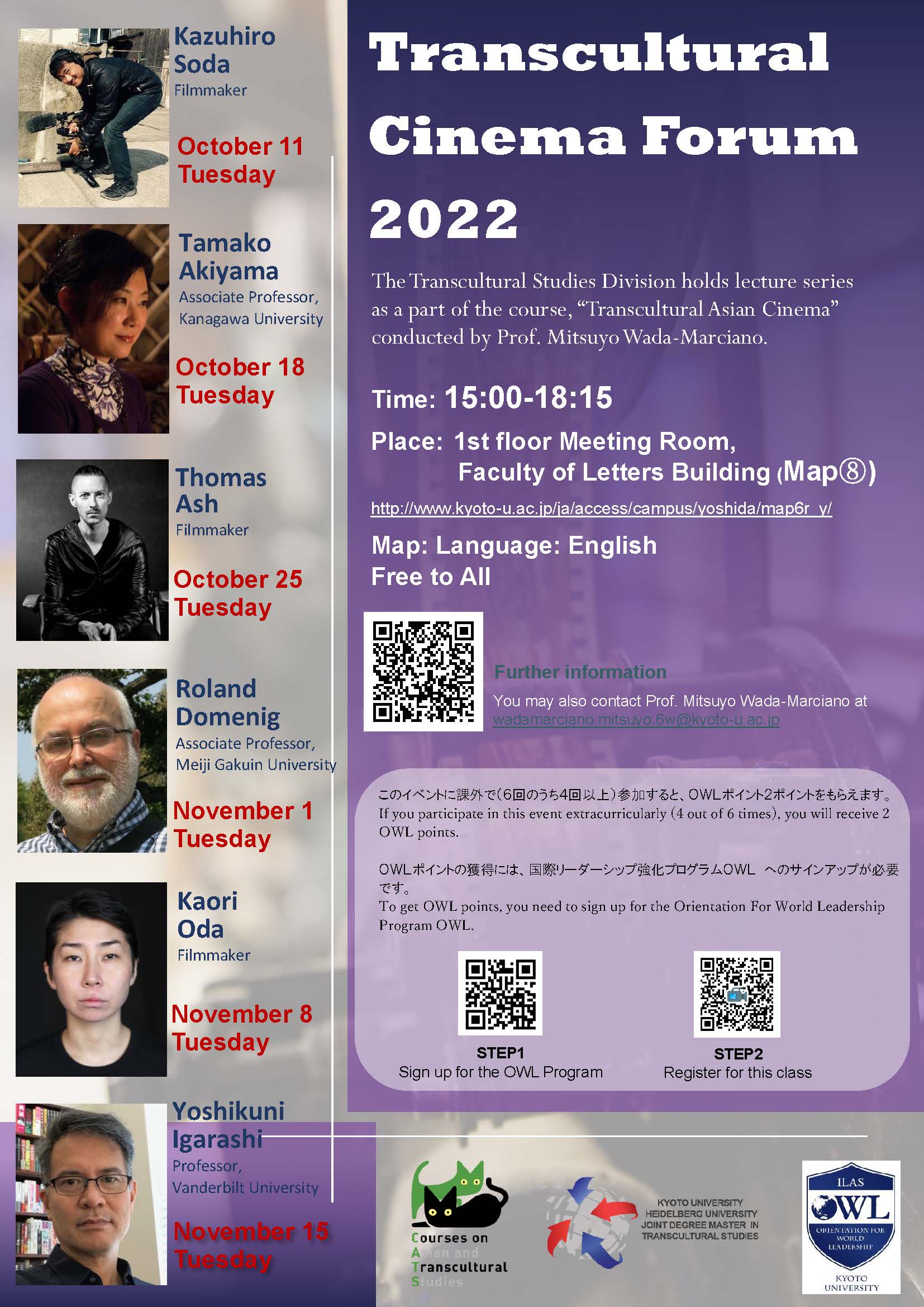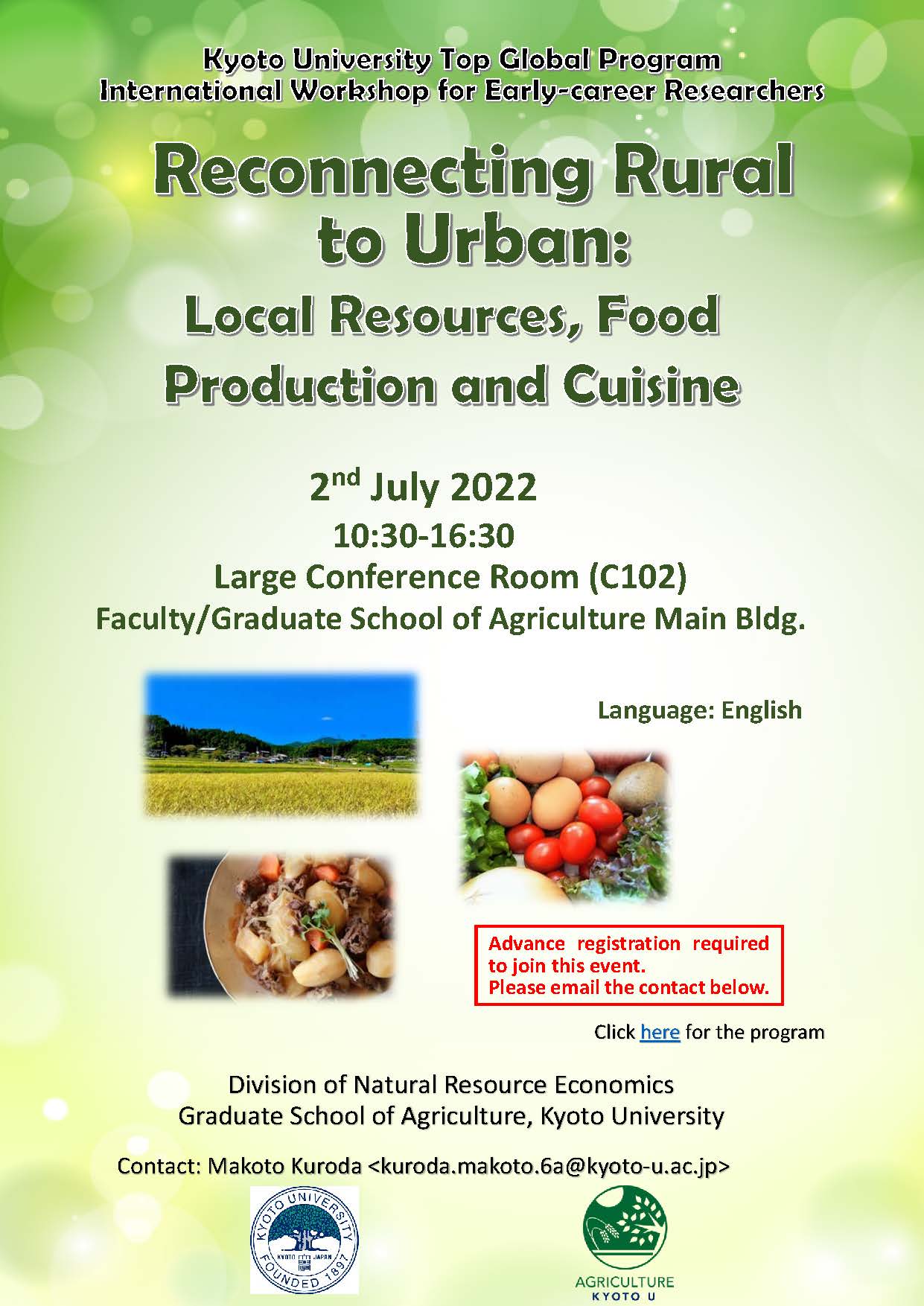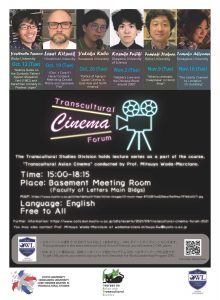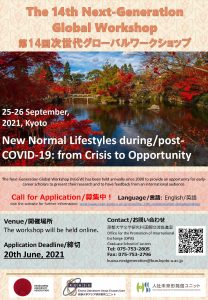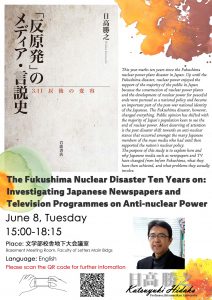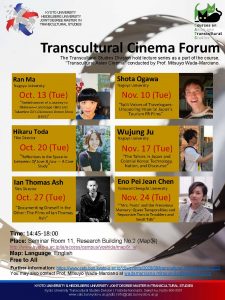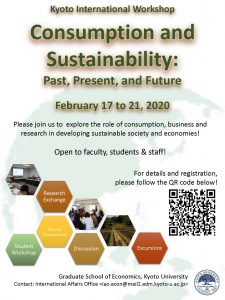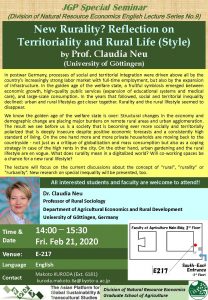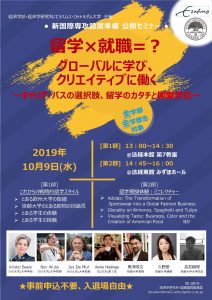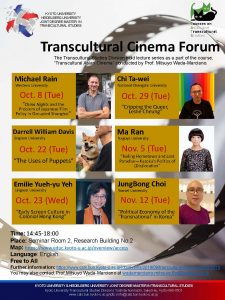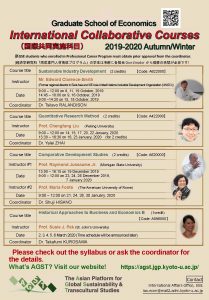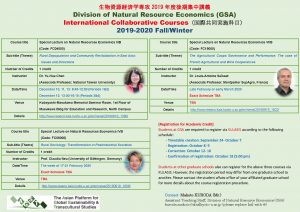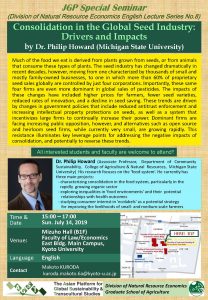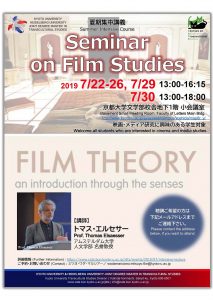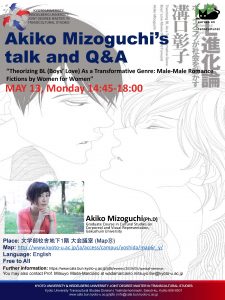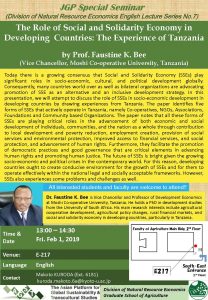Transcultural Cinema Forum (2022/10/11~2022/11/18)
Division of the Joint Degree Master of Arts Program in Transcultural Studies (JDTS), Graduate School of Letters hold lecture series as a part of the course, “Transcultural Asian Cinema” conducted by Prof. Mitsuyo Wada-Marciano.
For further information, please refer to JDTS website
Click here to see the poster.
[Contact]
Prof. Mitsuyo Wada-Marciano at wadamarciano.mitsuyo.6w[at]kyoto-u.ac.jp. (please replace [at] with @)
International Workshop for Early-career Researchers (July 2)
The Division of Natural Resource Economics in the GSA will be organizing an international workshop for early-career researchers titled “Reconnecting Rural to Urban: Local Resources, Food Production and Cuisine”.
[Date & Time]
2nd July 2022
10:30-16:30
[Venue]
Large Conference Room (C102) of the Faculty of Agriculture Main Bldg. in the North Campus.
[Program]
Click here for the program (incl. a map of the venue)
[Registration]
Advance registration required to join the workshop.
Please register by emailing the contact below.
[Contact]
Makoto Kuroda (Mr)
Division of Natural Resource Economics, GSA.
kuroda.makoto.6a[at]kyoto-u.ac.jp (please replace [at] with @)
Transcultural Cinema Forum (2021/10/5~2021/11/30)
Division of the Joint Degree Master of Arts Program in Transcultural Studies (JDTS), Graduate School of Letters hold lecture series as a part of the course, “Transcultural Asian Cinema” conducted by Prof. Mitsuyo Wada-Marciano.
For further information, please refer to JDTS website
Click here to see the poster.
[Contact]
Prof. Mitsuyo Wada-Marciano at wadamarciano.mitsuyo.6w[a]kyoto-u.ac.jp. (please replace [at] with @)
The 14th Next-Generation Global Workshop (9/25/2021 – 9/26/2021)
The 14th NGGW with the theme “New Normal Lifestyles during/post-COVID-19: from Crisis to Opportunity ” will be held on September 25 and 26, 2021 in Kyoto (Online)
organized by Kyoto University Asian Studies Unit, Graduate School of Letters.
In this workshop, we call for applications on these future prospects of a new normal from a wide range of perspectives,
including but not limited to the following areas. (Topics are not required to be related to COVID-19. In that case, relevant sessions will be assigned.)
1. Intimate sphere and lifestyle
2. Labor
3. Education
4. Public sphere
5. Social Protection
6. Sustainable Development Goals (SDGs)
For the details of the workshop, please refer to the following link.
http://www.kuasu.cpier.kyoto-u.ac.jp/news/the-14th-nextgeneration-globalworkshop/
[Contact]
Organizing Committee of the 14th Next-Generation Global Workshop, KUASU
Graduate School of Letters, Kyoto University
E-mail: kuasu.nextgeneration[at]bun.kyoto-u.ac.jp
(please replace [at] with @)
Special Seminar on Cinema and Media Studies
The Transcultural Studies Division will hold a special seminar entitled “The Fukushima Nuclear Disaster Ten Years on: Investigating Japanese Newspapers and Television Programmes on Anti-nuclear Power” presented by Dr. Katsuyuki Hidaka, College of Social Sciences, Ritsumeikan University.
Please find the seminar poster here: PDF
Further information: https://www.cats.bun.kyoto-u.ac.jp/jdts/events/2021/04/special-seminar-on-japanese-newspapers-and-television-programmes-on-anti-nuclear-power2021-6-8/
Virtual International Graduate Student Workshop
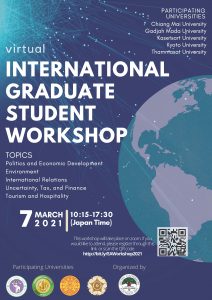
The Graduate School of Economics hosts the “International Graduate Student Workshop”
[Date]
March 7, 2021
10:15-17:30
[Venue]
Online (zoom)
[Schedule]
Click here to see the programme
[Event report]
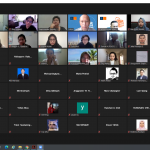
On March 7, 2021, Kyoto University hosted an online one-day workshop for graduate students to present their research projects, learn from their peers’ research activities, and network. Participants were from Chiang Mai University (Faculty of Economics), Kasetsart University (Faculty of Economics), Thammasat University (Faculty of Political Science, and Thammasat Institute of Area Studies), Gadjah Mada University (Faculty of Economics and Business), and Kyoto University (Graduate School of Economics). Presentations were divided into eight sessions and covered five broad themes: (1) politics and economic development, (2) environment, (3) international relations, (4) uncertainty, tax, and finance, and (5) tourism and hospitality. A total of 33 students presented their current research projects and proposals for their master’s thesis or doctoral dissertations. Students from Kyoto University’s International Graduate Programme for East Asia Sustainable Economic Development Studies undertook several organizational activities such as overseeing the secretariat, preparing the proceedings, and creating and distributing the event poster.
Several faculty members from each participating university also attended the workshop and actively participated in the discussions. Prof. Shuji Hisano (Director of the International Graduate Programme for East Asia Sustainable Economic Development Studies and the Asian Platform for Global Sustainability and Transcultural Studies at Kyoto University) kicked-off the workshop by welcoming the participants. He was pleased to announce how Kyoto University and its partner universities in Indonesia and Thailand could continue to collaborate despite restrictions to in-person meetings. The workshop was a great opportunity to “keep ties.”
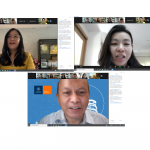
In their closing remarks, Prof. Vijitsri Sanguanwongse (Dean of the Faculty of Economics, Kasetsart University), Prof. Juthathip Jongwanich (Faculty of Economics, Thammasat University), and Prof. Mamduh M. Hanafi (Director of the Doctoral Programme in Management, Faculty of Economics and Business, Universitas Gadjah Mada) all reiterated their wish for continued collaboration between universities. They thanked Kyoto University for the initiative because the workshop gave students an experience presenting in an international setting and allowed them to build their networks. Finally, all speakers wished to meet each other in person again soon.
At the end of the workshop, participants filled out a short evaluation form. The following describes some of the key highlights from the post-workshop evaluation. Presenters noted how they received constructive feedback and practical advice from their peers and attending faculty members about how to improve their work. Others said that they got new research ideas and learned about new research methods. Participants also praised the effective time management and welcoming atmosphere of the workshop. They noted that the relaxed atmosphere facilitated open discussions and frank exchanges.
“The workshop was a good place for graduate students to present their work freely and practicing discussions with peers,” commented one of the presenters.
Overall, it seemed that most enjoyed exchanging with fellow students from East Asian universities and working on topics related to East Asia and that many were pleased that they could participate even if it was online. Despite the diversity of topics and approaches, they share the same regional concerns that made the exchanges more fruitful.
Even the Kyoto University students who were involved in the workshop organization found that their participation was rewarding.
“I found it very meaningful to join the organization team of this workshop. This experience will be useful for my career,” wrote a student-member of the organizing committee.
Considering these comments, the workshop seems to have met its objectives. As for ways for improvement, participants noted that the discussion time could be extended. Others wished that future workshops be organized on a weekday rather than on Sunday. These comments will undoubtedly be taken into consideration in the future.
Transcultural Cinema Forum (2020/10/6~2020/12/1)
Division of the Joint Degree Master of Arts Program in Transcultural Studies (JDTS), Graduate School of Letters hold lecture series as a part of the course, “Transcultural Asian Cinema” conducted by Prof. Mitsuyo Wada-Marciano.
For further information, please refer to JDTS website;
https://www.cats.bun.kyoto-u.ac.jp/jdts/events/2020/09/transcultural-cinema-forum-2020/
Click here to see the poster.
[Contact]
Prof. Mitsuyo Wada-Marciano
wadamarciano.mitsuyo.6w[at]kyoto-u.ac.jp.
(please replace [at] with @)
The 13th Next-Generation Global Workshop
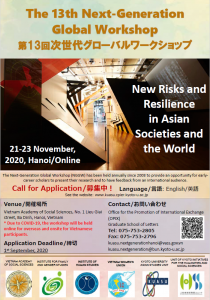
The Next-Generation Global Workshop (NGGW) has been held annually since 2008 (see the Annex for information of the annual topics of NGGWs since 2008 and key products) to provide an opportunity for early-career scholars to present their research in English and to obtain feedback from an international audience. It has proved to be a pleasant and effective way for capacity building through the mentorship provided by the professors of participating universities around the world. It has also served as an invaluable opportunity for participants to learn from one another and deepen their understanding of various social phenomena in the world, particularly in Asia. Ultimately, the NGGW has acted as a forum for scholars of different generations and from various regions to build a common academic foundation by redefining Asia in a global context.
Recent decades have witnessed a surprisingly fast progression in the economies of Asia. The region has not only become the largest manufacturer, but also the biggest market in the world. Together with tremendous economic growth, our societies have faced a number of economic, cultural, and social challenges. Rapid population aging, strongly increased rural-urban migration and international migration create or accentuate social issues related to care, policy, social services and adaption. At the same time, the effects of inequality, climate change, etc. have become increasingly obvious prompting governments and individuals to make reforms and changes to cope with new risks. Demographic transition, international migration (including transnational marriage) and so on, have led to changes in family structure and values, and the emergence of new family patterns has created obstacles for families to perform traditional functions such as caring for the elderly and children. At the family and social level, women increasingly obtain higher education and participate widely in the labour market, yet continue to experience inequality in politics, health care, wage payment, and the quality of employment and social services etc. These facts contribute to the rise of new risks that challenge family life in particular and society in general and multifaceted way that requires suitable resilience and solutions. Needless to say, the societies in other parts of the world are facing the same challenges. This year, the coronavirus pandemic challenges our resilience and ability to recovery at both the macro and micro levels. In both East and West, the upheaval confronts our health care systems, economy resilience, governance and international relationships around the world.
Resilience has been understood as the ability to reduce the chances of a shock or to absorb it when it happens. The concept also refers to the ability of a system to recover quickly after a shock. In other words, a resilient system should cover the whole process from preparation, consequences handling, and restoration. More specifically, resilience means to minimize possible failures and then to reduce the consequences from failures (in terms of lives lost, damage, and negative economic and social consequences), and finally, to speed up the recovery towards normality. Resilience may differ from one society to another, and from a certain risk to another.
This workshop will explore how individuals, families, societies perceive and adapt to risks in a given socio-cultural setting, and explore alternative dimensions of resilience from an interdisciplinary viewpoint. Based on these ideas, this workshop will explore a wide range of topics in Asian countries as follows (though not excluding others):
- 1. The impact of climate change and resilience in the face thereof
- 2. Population aging and social issues
- 3. Transformation of marriage and families
- 4. Gender (in)equality
- 5. Value changes
- 6. Social security
- 7. Pandemic, health and care models
- 8. Migration
- 9. Labor market flexibility and adaptability
- 10. Economic development patterns and trends.
[Date]
21-23 November, 2020
[Venue]
Vietnam Academy of Social Sciences (No. 1 Lieu Giai street, Ba Dinh, Hanoi, Vietnam)
※Due to the COVID-19, the workshop will be held at ONLINE for overseas participants(not from Vietnam)/ONSITE for Vietnamese participants.
[Programme]
※Looking for Participants
[More Detailed Inofrmation]
http://www.kuasu.cpier.kyoto-u.ac.jp/news/the-13th-nextgeneration-globalworkshop/
[Contact]
Organizing Committee of the 13th Next-Generation Global Workshop
– Tran Thi Minh Thi (Director, IFGS), Trinh Thai Quang, Nguyen Ha Dong, Nguyen Huu Minh, Dang Thi Hoa, Tran Thi Hong, Phan Huyen Dan (Institute for Family and Gender Studies, Vietnam Academy of Social Sciences, Vietnam).
– Ochiai Emiko (Director, KUASU), Asato Wako, Mieno Fumiharu, Deguchi Yasuo, Kawashima Takashi, Steven Ivings, Lu Wanxue, Hisada Yurie (Kyoto University, Japan).
E-mail: kuasu.nextgenerationhanoi[at] vass.gov.vn
kuasu.nextgeneration[at] bun.kyoto-u.ac.jp
(please replace [at] with @)
Kyoto International Workshop “Consumption and Sustainability: Past, Present, and Future”
The Graduate School of Economics is holding Kyoto International
Workshop “Consumption and Sustainability: Past, Present, and Future”
from February 17 to 21, 2020.
Please refer to the following link for the details
(some sessions are open to students).
http://www.econ.kyoto-u.ac.jp/kueac/courses/course-events-and-activities/kiw/
[Contact]
International Affairs Office, Graduate School of Economics
iao.econ[at]mail2.adm.kyoto-u.ac.jp
(please replace [at] with @)
Kyoto University & University of Göttingen Joint Graduate Workshop on February 26-28
On 26-28 February 2020, as part of the Japan Gateway: Kyoto University Top Global Program (JGP), we will be holding 2020 Kyoto University & University of Göttingen Joint Graduate Workshop themed “Towards a Sustainable Future of Food, Agriculture and Rural Society.” From the University of Göttingen, Dr. Claudia Neu (Professor of Rural Sociology) and eight graduate students under her supervision will be participating in this three-day workshop.
[Further information]
http://www.reseco.kais.kyoto-u.ac.jp/en/news/20200213_1690/
[Contact]
Makoto Kuroda (Mr)
Division of Natural Resource Economics, GSA.
kuroda.makoto.6a[at]kyoto-u.ac.jp
(please replace [at] with @)
JGP Special Seminar with Prof. Claudia Neu on February 21, 2020
On the 21st of February (Friday) 2020, as part of the Japan Gateway: Kyoto University Top Global Program (JGP) , the Division of Natural Resource Economics in the GSA will be organising a special seminar entitled “New Rurality? Reflection on Territoriality and Rural Life (Style) ” presented by Prof. Claudia Neu from the University of Göttingen. All interested students and faculty are welcome to attend.
[Time/Date]
14:00-15:30 February 21 (Fri), 2020
[Venue]
Room E217, 2nd Floor, Faculty/Graduate School of Agriculture Main Bldg.
[Further information]
http://www.reseco.kais.kyoto-u.ac.jp/en/news/20200131_1670/
[Contact]
Makoto Kuroda (Mr)
Division of Natural Resource Economics, GSA.
kuroda.makoto.6a[at]kyoto-u.ac.jp (please replace [at] with @)
[October 9th] Open Seminar” 経済学部公開セミナー「留学×就職=?」”
The Faculty of Economics will hold an open seminar on which entitled
” 経済学部公開セミナー「留学×就職=?」”.
We will invite the president and professors of the Erasmus University Rotterdam to introduce their International programs and also we’d like to share a new project for master degree currently we’re working on.
No reservation is required
Admission is free
We’re looking forward to having you join us!
[Date & Venue]
Part 1: 13:00-14:30@ 法経第七教室, 1F, Faculty of Law / Economics Main Bldg.
「これからの戦略的留学スタイル」
Part 2: 14:45-16:00@ Mizuho hall, BF, Faculty of Law / Economics East Bldg.
「留学模擬体験:ミニレクチャー」
*Please be aware of the venue.
Click here to see the poster.
Transcultural Cinema Forum (2019/10/8~2019/11/12)
Division of the Joint Degree Master of Arts Program in Transcultural Studies (JDTS), Graduate School of Letters hold lecture series as a part of the course, “Transcultural Asian Cinema” conducted by Prof. Mitsuyo Wada-Marciano.
For further information, please refer to JDTS website;
https://www.cats.bun.kyoto-u.ac.jp/jdts/events/2019/09/transcultural-cinema-forum-2019
[Contact]
Prof. Mitsuyo Wada-Marciano
wadamarciano.mitsuyo.6w[at]kyoto-u.ac.jp.
(please replace [at] with @)
International Collaborative Courses in 2019-2020 Autumn/ Winter (GSE)
[Course contents]
Access the KULASIS for details.
Click here to see the poster
[Course registrations]
Students who need credits: register during the period of course registration at the Student Affairs Office.
Students who want to audit: contact the coordinator (GSE professors) and apply for participation.
GSE professors in charge of each courses are indicated in syllabus.
[Note]
For general questions, please contact International Affairs Office, GSE
We welcome your participation!
International Collaborative Courses in 2019-2020 Fall/ Winter (GSA)
As part of a series of International Collaborative Courses offered by AGST, the Division of Natural Resource Economics (GSA) will hold three intensive lectures courses given by guest scholars invited from overseas universities.
[Course contents]
Click here to see the poster.
Visit the following links for further information:
Special Lecture IIIB:
http://www.reseco.kais.kyoto-u.ac.jp/en/news/20190919_1590/
Special Lecture IVB:
http://www.reseco.kais.kyoto-u.ac.jp/en/news/20190919_1606/
Special Lecture VIIB:
http://www.reseco.kais.kyoto-u.ac.jp/en/news/20190919_1622/
[Registration for Academic Credit]
Please contact the student affairs office of your affiliated graduate school for details about the course registration procedure.
[Contact]
Makoto KURODA (Mr)
Division of Natural Resource Economics, GSA.
kuroda.makoto.6a[at]kyoto-u.ac.jp (please replace [at] with @)
JGP Special Seminar with Dr. Philip Howard on July 14, 2019
On the 14th of July (Sunday) 2019, as part of the Japan Gateway: Kyoto University Top Global Program (JGP) , the Division of Natural Resource Economics in the GSA will be organising a special seminar entitled “Consolidation in the Global Seed Industry: Drivers and Impacts” presented by Dr. Philip Howard from Michigan State University. All interested students and faculty are welcome to attend.
[Time/Date]
15:00-17:00 July 14 (Sun), 2019
[Venue]
Mizuho Hall (B1F), Faculty of Law/Economics East Bldg. , Main Campus
[Further information]
(ENG): http://www.reseco.kais.kyoto-u.ac.jp/en/news/20190614_1569/
(JPN): http://www.reseco.kais.kyoto-u.ac.jp/news/20190614_1569/
[Contact]
Makoto Kuroda (Mr)
Division of Natural Resource Economics, GSA.
kuroda.makoto.6a[at]kyoto-u.ac.jp (please replace [at] with @)
Seminar on Film Studies
The Transcultural Studies Division hold an intensive lecture course entitled “Film Studies” (Foundation I – Seminar (VMC)), taught by Prof. Thomas Elsaesser from the University of Amsterdam on July 22-26 and July 29-30 and conducted by Prof. Mitsuyo Wada-Marciano.
[Further information]
https://www.cats.bun.kyoto-u.ac.jp/jdts/events/2019/07/intensive-lecture/
[Contact]
Prof. Mitsuyo Wada-Marciano
wadamarciano.mitsuyo.6w[at]kyoto-u.ac.jp.
(please replace [at] with @)
The Cinema Audience as Social Subjects in Transmedia and History
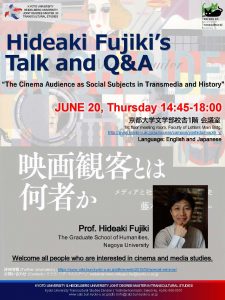 The Transcultural Studies Division will hold a special seminar entitled “The Cinema Audience as Social Subjects in Transmedia and History” presented by Prof. Hideaki Fujiki, Graduate School of Humanities in Nagoya University.
The Transcultural Studies Division will hold a special seminar entitled “The Cinema Audience as Social Subjects in Transmedia and History” presented by Prof. Hideaki Fujiki, Graduate School of Humanities in Nagoya University.
[Further information]
https://www.cats.bun.kyoto-u.ac.jp/jdts/events/2019/06/special-seminar
[Contact]
Prof. Mitsuyo Wada-Marciano
wadamarciano.mitsuyo.6w[at]kyoto-u.ac.jp. (please replace [at] with @)
Akiko Mizoguchi’s Talk and Q&A
The Transcultural Studies Division will hold a special seminar entitled “Theorizing BL (Boys’ Love) As a Transformative Genre: Male-Male Romance Fictions by Women for Women” presented by Dr. Akiko Mizoguchi, Graduate Course in Cultural Studies on Corporeal and Visual Representation.
[Further information]
https://www.cats.bun.kyoto-u.ac.jp/jdts/events/2019/05/special-seminar
[Contact]
Prof. Mitsuyo Wada-Marciano
wadamarciano.mitsuyo.6w[a]kyoto-u.ac.jp. (please replace [at] with @)
JGP Special Seminar at GSA on February 1, 2019
On the 1st of February 2019, as part of the Japan Gateway: Kyoto University Top Global Program (JGP), the Division of Natural Resource Economics will be holding a special seminar entitled “The Role of Social and Solidarity Economy in Developing Countries: The Experience of Tanzania” presented by Prof. Faustine K. Bee, Vice Chancellor of Moshi Co-operative University, Tanzania.
All interested students and faculty are welcome to attend. No registration is required.
[Time/ Date] 13:00- 14:30 on February 1 (Fri), 2019
[Venue] Room E-217, Faculty of Agriculture Main Bldg.
[Further information]
(ENG): http://www.reseco.kais.kyoto-u.ac.jp/en/news/20190122_1506/
(JPN): http://www.reseco.kais.kyoto-u.ac.jp/news/20190122_1506/
[Contact] Makoto KURODA (Mr)
Division of Natural Resource Economics, GSA.
kuroda.makoto.6a[at]kyoto-u.ac.jp (please replace [at] with @)



